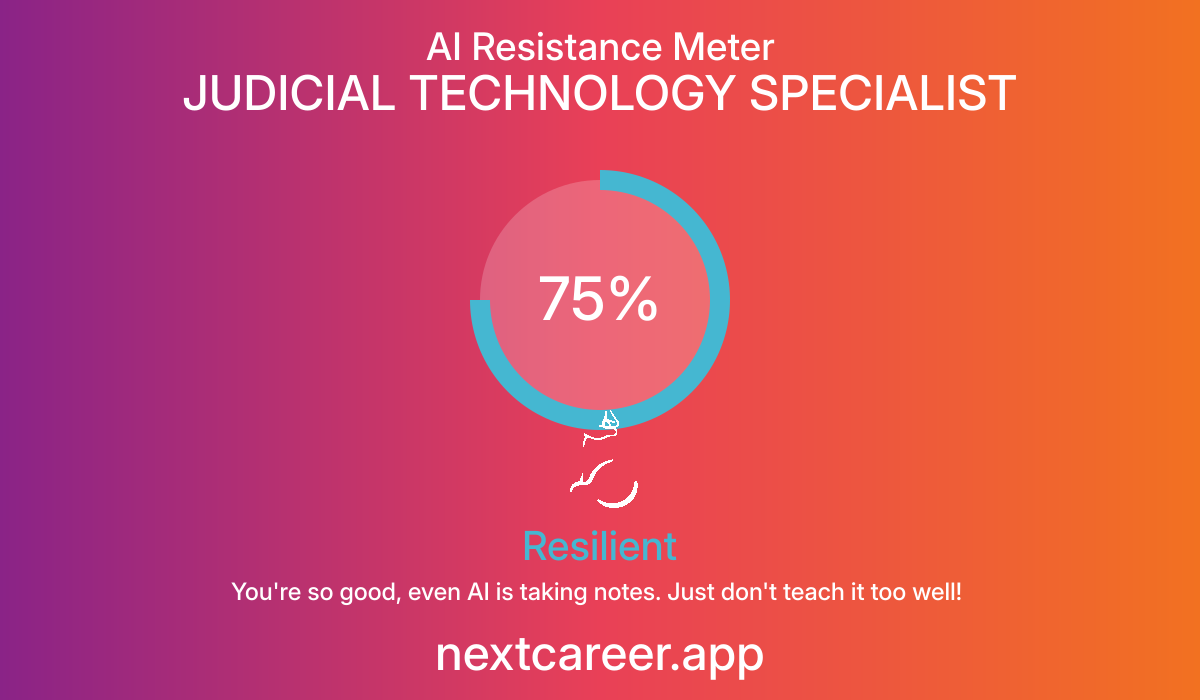AI Resistance Analysis
JUDICIAL TECHNOLOGY SPECIALIST
JUDICIAL TECHNOLOGY SPECIALIST
AI Resistance Score
AI Resistance Meter
Resilient
JUDICIAL TECHNOLOGY SPECIALIST
You're so good, even AI is taking notes. Just don't teach it too well!
Judicial Technology Specialists play a critical role in integrating technology into the legal and judicial systems, which involves both technical skills and an understanding of legal processes. While specific technical tasks may be automated, the breadth of knowledge required, coupled with the ability to understand and navigate complex legal frameworks, makes this role relatively resistant to full automation.
Judicial Technology Specialists play a critical role in integrating technology into the legal and judicial systems, which involves both technical skills and an understanding of legal processes. While specific technical tasks may be automated, the breadth of knowledge required, coupled with the ability to understand and navigate complex legal frameworks, makes this role relatively resistant to full automation.
Key Factors
- Cognitive Tasks: Many procedural tasks can be automated with advance AI, yet the analytical and comprehensional demands of legal frameworks mitigate this.
- Emotional Intelligence: This role requires high levels of emotional intelligence to communicate with legal professionals and stakeholders.
- Physical Skills: The physical aspects are minimal, but they involve some technical skills for setup and maintenance of legal software.
- Creative Thinking: The capacity for innovative solutions in the realm of legal technology can set specialists apart from AI.
Human Advantages
- Deep understanding of legal contexts is irreplaceable by AI.
- Capacity to empathize and effectively communicate with diverse groups.
AI Vulnerabilities
- Standardizable tech implementations can be automated.
- Document review processes could be impacted by AI algorithms.
Recommended Actions
- Engage in continuous professional development in AI and legal tech.
- Collaborate with AI specialists to understand the systems better.
- Shift focus to roles that emphasize strategic oversight and ethical implications of AI in the judicial domain.
In the near term, judicial technology specialists will likely adopt AI tools to improve efficiency, focusing more on higher-level problem-solving and strategic implementation of technology. In the long term, as AI capabilities grow, these specialists may transition towards roles that emphasize oversight and governance of automated systems, pushing towards human-centered technology applications in law. The demand for specialists who can interpret AI outputs and their implications in legal contexts will grow even as AI continues improving.

Why Calculate AI Resistance?
Understanding how AI-resistant your career is becoming increasingly important in today's rapidly evolving job market. Our analysis combines multiple factors including required human skills, technological adaptability, and future industry projections to give you a comprehensive view of your career's sustainability.